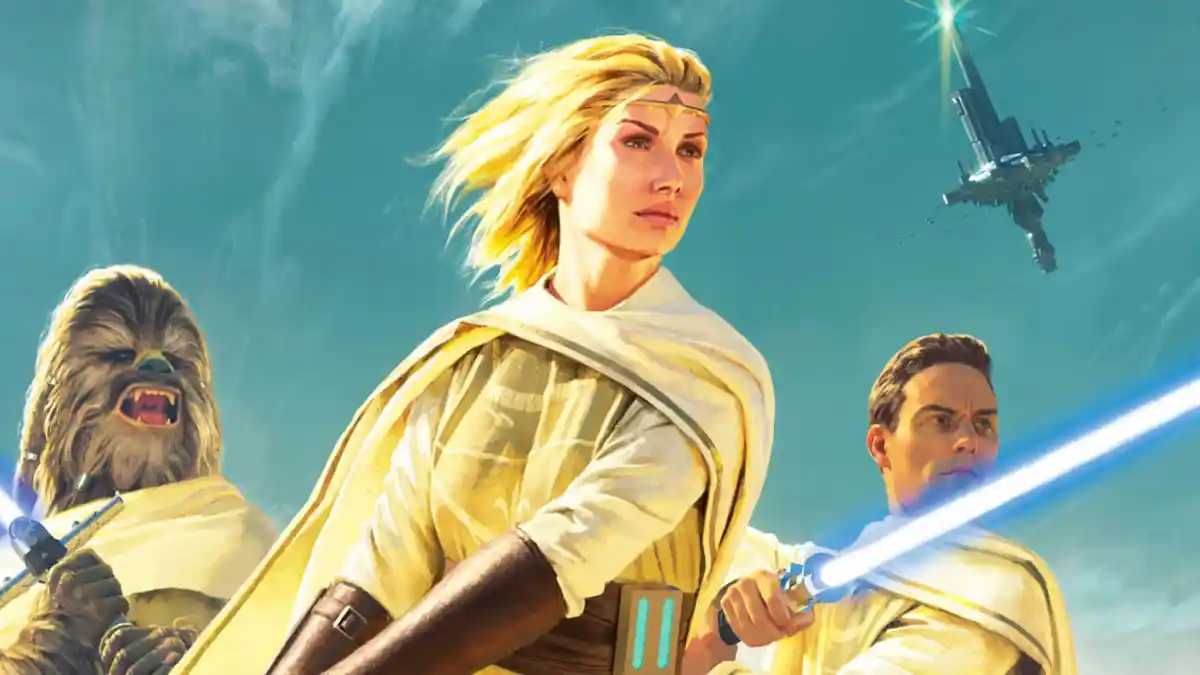“The hum of his blade made Bell think of all these things at once. He suspected the marauders they were rapidly nearing assigned an entirely different meaning to the sound. He thought it probably sounded like…consequences.” Okay, there’s a lot to unpack here.
Often when we talk about quality storytelling in media, we’re digging into the characters, plot, and world-building. However, the quality of writing sabotages all such discussions in Charles Soule’s Star Wars: Light of the Jedi. As the first bold step into a new setting, Light of the Jedi is less the High Republic’s Iron Man and more an incoherent miasma of squandered potential.
Amid its drawn-out pacing and odd creative choices, Light of the Jedi is a fairly traditional disaster story about a hyperspace jump gone wrong, resulting in a colony ship’s remains raining down on a farming world, and the Jedi Order’s response to the threat. Soule is known for his solid comics writing and has crafted some fan-favorite Star Wars tales. When he solely focuses on dialogue and direct action, you can see that same sharp storytelling here, but such moments are lost in a sea of monolithic paragraphs describing irrelevant topics to the story at hand.
In the middle of a crisis, Soule takes readers on tangents about local singers and the harvest seasons on the planet of Hetzal. The arrival of the Jedi is heralded by some of the stiffest, most forced and perfunctory explanations for world-building I’ve read in some time. Prepare to learn pointedly about how a Vector starfighter holds up to two pilots and that often those two pilots are a Jedi and their padawan. The agricultural output of the region receives a spotlight as well.

Light of the Jedi takes every opportunity to stop the story to focus on extraneous details instead of making the effort to weave them organically into the narrative. It reads far too often like an educational pamphlet that sometimes remembers it’s supposed to be entertaining. A chapter may also abruptly cut off and change to a different character elsewhere. It’s clearly meant to make it feel like everything’s happening in real time, but instead it drags the already slow pacing to a crawl. It ultimately began to pull me out of the story.
Gratuitous sentence fragments don’t help either, one intentionally flaunted at the end of a chapter. Plus, for every solid emotional moment, there are lines like, “‘I can relate to your frustration, dear,’ his wife said. ‘I still want to try saving these people.’”
What’s particularly damning is that when the book gets out of its own way, there are poignant moments and characters. We’re seeing a tragedy on par with the Hindenburg and 9/11 set in the Star Wars landscape. The initial deaths in the earliest chapters land perfectly, even if some of the characters sacrificed are vastly more interesting than those who survive. You see the story from multiple levels, including every rank of Jedi, planetary officials, Republic officers, and even a humble scanner technician.
In fact, the politically charged scenes are often the best, as they typically rely heavily on dialogue and social cues. Somehow the one thing everyone found most boring about the prequel trilogy is where the most immediate and impactful drama occurs in Light of the Jedi. This truly feels like an era where the Republic was peacefully expanding and relaxing, only to be jarred awake by tragedy. It’s a shame the story often struggles to harness that.
Each character’s perspective here is palpably full of panic, desperate heroism, and earned tension, but you have to work through too much baggage to find the heart of the story. The first hundred or so pages are only the prologue to the story actually starting. The antagonists, the Nihil, don’t make themselves known until you’re more than a third of the way through the book. Till then, the “Great Disaster” of the ship’s destruction is itself the threat.
To compensate for the slow prologue pacing, Soule starts killing off characters to try to ratchet up the pathos, yet sometimes it’s downright comedic. By the end of the prologue, the majority of the most likable characters are gone, leaving you listlessly floating until the story begins a second time at just as glacial a pace to establish the Nihil’s aims to ravage the Republic. By the end, it’s hard to remember what the point of this all was. Plus, with how expendable and overloaded the cast is, there’s not much room for character development in the first place.
Characters have cringeworthy names like Casset, Burryaga Agaburry, and Peeples. Likewise, the antagonists are called the Nihil because they’re nihilistic space Vikings, in case you were worried Star Wars was opening up to subtlety any time soon. The two moons that orbit Hetzal Prime are even called Fruited and Rooted.
Furthermore, there’s an obvious tug of war between assuming you know how the universe works and assuming you know nothing. The result is some planets and species are casually waved off, whereas others elicit extremely unnatural lines like, “I’m Nautolan, a fact of which I’m sure you’re both aware. Green skin, big black eyes, what else would I be?” The story has both too much and too little confidence in reader knowledge.
The Nihil have serious potential as antagonists, but seeing as this book is merely establishing them, all they offer is just that — potential. They’re willing to actually get their hands dirty in a way Disney’s Star Wars has been leery of. They evoke the brutality of the One Sith from Legacy. It helps that they have room to legitimately develop, but they can’t act dramatically on any shifting power dynamics here because this is still just the first book in a large-scale media project. You aren’t met with a satisfying conclusion — just an elaborate “To be continued! Please buy the next wave of books!”

Ultimately, this book was not ready yet, and it’s saddening to see. For every scene of high-speed action or a grounded moment of humanity in a galaxy slipping out of control, there’s a new problem that breaks you out of the flow of reading. The narration itself can be oddly uncertain, spewing a surprising amount of “almosts” and “wasn’ts,” as if Soule couldn’t decide what adjectives and metaphors he wanted to use. There are some odd syntax choices as well that neither make the prose sound older, nor lend it an alien or otherworldly quality.
This novel is written to launch an entire new era of Star Wars fiction, and it feels like it. However, it evokes the overloaded plotting of Amazing Spider-Man 2, just in slow motion. It’s such a shame as, if you trimmed all the excessive details, retooled some wording, chose one of the two plots to focus on, and honed in on the truly touching parts of the story, there would be a worthwhile read here.
If you can look past it’s many problems, Star Wars: Light of the Jedi isn’t the worst book to kick off 2021 with. Nothing presented here is going to blow your mind or warrant picking up a hardcover copy, but Light of the Jedi might do the trick for a long car ride or waiting out quarantine. However, as it is, it’s the prose equivalent of a buggy video game, and like a game full of glaring glitches, it would have been better to delay it further and polish the end product. This should be a momentous event in Star Wars history, both in-universe and externally. Instead, Light of the Jedi dims one’s expectations for the High Republic era going forward.






Published: Jan 12, 2021 11:00 am